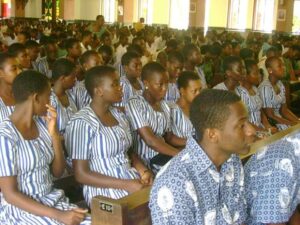The missionaries and formal education
Many Missionaries or Mission Groups that advanced the shores of Ghana numerous years ago were: The Roman Catholic, Methodist, Presbyterian and Anglican Churches. It would be admitted that these brought along the Gospel of Christ on one hand and formal education on the other. Doubtless, they had a vision like the late Nelson Mandela, who said, “Education is the most powerful weapon to change the world”. Mission Schools had a core mandate, to pass on knowledge, values, morals and faith. This was done diligently, passionately and above all with love.
Mission Schools in the past had dominated in the country both in numbers and performance. It is evident that they played and still play a very significant role in the provision of holistic education in the country. It was every parent’s dream to have their wards in these schools. Pastors, priests, Rev. Brothers and Rev. Sisters (nuns), most of whom were also trained teachers or other, were involved in the running of these schools, to provide quality education and impacting knowledge to the Ghanaian child. Additionally, these selfless servants: Priests, Religious or Pastors served as local managers of these schools and helped in the character formation and moral training of the children in the school, providing guidance and counseling, sometimes serving as both assistant teachers and also as parents in various ways. In no small way, they were always a source of encouragement and protection to the students especially those that were academically weak.
One thing stood out, and was common in all these Mission Schools; this was the hallmark for discipline. This was not meant to turn the student into perfect human beings overnight but to help shape up their perception of life; what it means to be a seasoned or matured person, as Einstein, puts it so perfectly that “Education is not just the learning of facts and figures but the training of the mind to think”.
The “Big Brother” Partnership
The government, years later, came in as a “Big Brother” to help streamline things in the public sector, hence, introduced the concept of trained teachers in most schools, especially in Mission Schools, and subsequently absorbed the payment of teachers as well. This, for many churches was a great relief as some Mission Schools were besieged with the burden of payment of salaries to teachers. Again, most churches esteemed this partnership with the government, since the government equally provided these schools not only facilities, infrastructure and instruments but also educational aids to educate her citizenry. Educational aids, such as: reading books, exercise books and even in some cases furniture were provided. Invariably, these juicy incentives eventually gave so much control and power to the government over Mission Schools. Nevertheless, this move or kind gestures in disguise by the government were neither documented by churches nor seen as a way forward to lobby for partnership with the government.

Today, what is left of the ownership of Mission Schools is just the patron or saints names they bear. Both elementary and second cycle Mission Schools are now controlled by the government. For instance, the Catholic Church has a Catholic Education Unit, which years ago spoke on behalf of the church concerning educational matters, facilitated posting and assignment of teachers to their facilities or schools, visited schools as supervisors; check on the performance of both teachers and students and helped address issues affecting the schools. Sad to say, that today, most of these offices in the various dioceses are reduced to just organizing Catholic Education Week celebrations.
Practically, now, the school curriculum and other activities of the schools are all dictated by the government. All those aspects of morals, faith values and discipline, which were part of the reasons for building the schools have been trivialized or at best taken off. What we have now is knowledge on facts and figures. As a result, we are now faced with moral decadence in our society, where a student can openly and rudely insult their teachers, parents supporting their wards against the very persons who are impacting knowledge to their children and they dress seductively and suggestively.
Today, gross insubordination is trickling down in every aspect, spear and corner of not only our society but in our schools. This gradual deteriorating in Mission Schools have also rendered a lot of churches to pay very little attention or are uninterested in their own schools especially at the basic schools. Whatever happens in these schools does not seem to reach the church authorities. In some places, where we have Mission Schools, there is no cordial relationship between the schools and the church who are the rightful owners.
Nevertheless, the various Church Leaders in the country, notably the Catholic Bishops Conference and the Christian Council of Churches have tried a number of times to petition the government to come on board for dialogue and partnership with regards to their schools but these efforts over the years have turned futile. The number of times both the National Democratic Congress (NDC) and National Patriotic Party (NPP) were in power, Church Leaders at various times had approached them for a possible dialogue and team work but all those efforts never saw the light of day.
The irony of this situation is that the 2016 election manifesto of the ruling New Patriotic Party (NPP) suggests as it states: “We will build an effective partnership with religious bodies, civic organisations and the private sector in the delivery of quality education. This partnership will also include the areas of management, supervision and the training of teachers in their units” Furthermore, it also states: “The NPP will strengthen the participation of mission in the mission founded schools. We believe this will ensure the return of discipline and moral upbringing to our schools” The manifesto clearly places emphasis on the need for partnership and consolidating the relationship between government and mission schools to ensure not just education but quality education.
It will not be far-fetched to say that most of the people in governance today or politicians, who have benefited from Mission Schools in the past either directly or indirectly do not care the hoot about the churches plight. The question then is, why is government not fulfilling its campaign promises and why is it so difficult for them to at least dialogue with the churches? It appears Private schools these days are catching in on this unsettling relationship and striving better than Mission Schools. They seem to be making a considerable amount of impact. Probably, this could also be a wakeup call for Mission Schools to go private and continue the immense contribution they were impacting in society.

Apart from the several calls by the various churches to dialogue with the government, the religious bodies have complained for quite some time now that the quality of religious education in the pre-tertiary education curriculum is inadequate and there is need to do more. The religious bodies have complained for a very long time that religious education in our pre-tertiary education curriculum is inadequate and that there is the need to do more of the pastoral contents on the curriculum. As I mentioned earlier, during the 1987 educational reforms the National Catholic Secretariat, in a letter to GES (Ministry of Education), complained that the content of basic education did not have enough religious studies in it and that deficiency would adversely affect the moral and spiritual training of the children. They recognized moral training as a necessary complement for acquiring excellence in education.
The possible barriers to a dialogue/Partnership
Firstly, there are a couple of schools of thoughts that allude to some probable reasons why dialogue and a possible partnership between the government and the churches is difficult or almost impossible: Some believe that because the government is building her own schools alongside, if they allow the Mission Schools to operate as before, their schools will run empty of students or pupils. That notwithstanding, many parents will rather have their children in the Mission Schools because of the discipline and moral, which make them outstanding.
Secondly, another school of thought says, the government gets support from different donors outside the country for school programs, which have conditions attached to their donations. These donors dictate what should be done in the schools; from school curriculum to other administrative activities of the schools. Some of the conditions do not tally with the ideals of the Missions Schools. So to partner with the Mission Schools will impede their chances of getting these grants.
Thirdly, another school of thought alludes to the fact that, some of the Church Leaders should be blamed for the government’s lackadaisical attitude towards their petition to either partner or take their schools back. It has been assumed that some Church Leaders are meddling and fiddling in partisan politics. Some are running around for handouts or favors from politicians for their personal gains. This certainly if it is true, has the potential to mar any seriousness of any pursuit for a common goal. It is the teaching in most churches that Church Leaders are to eschew open affiliations to Partisan Politics since they are leading people with different political interests and so as “Shepherds of the flock”, it is only prudent and proper to keep their political cards to themselves to safeguard unity.
A final and critical thought is whether the Mission Schools are equally prepared and ready for what they are asking for or better still, the task ahead of them. There are a couple of Mission Schools administered by their own church members: as Head Teachers or Principals or even as classroom Teachers, however, Christian influence or impact on the lives of the children in those schools is appalling, they fail to live by example. Even after organizing any faith or Christian activity in the school these “Christian Teachers” most often than not, are always conspicuously missing in such activities. But it can be said that is binding on these Christian teachers as owners of the school and as Christian leaders more importantly must make an impact, particularly with their life style as Catholic, Presbyterian, Anglican or whichever Christian denomination they belong.
Conclusion/Recommendations
Mission Schools should continue to team up for partnership with the government. Partnership is the fairest thing to do now, since this will bring about cordial relationship and great development as well as quality and holistic education to the Ghanaian child. This is to say that there is the need to strengthen the already existing partnership between the GES and the mission schools in the areas of management, supervision and moral training. In other words, the government should continue to assign teachers to Mission Schools, however, in collaboration with the different Churches Education Units. Some amount of quota (at least half of the teachers from a specific faith group or church) be assigned to their Mission Schools by Ghana Education Service (GES).
Head Teachers or Principals of the Mission Schools, assigned by GES must be members of that particular church or faith group of the particular mission school. Mission schools should be allowed to introduce faith value lessons and moral education into the school curriculum. Some specified disciplinary measures be introduced; these should be consensus between parents, the particular religious’ bodies and GES before they are enforced.

Taking care of the structures of the Mission schools should be the prerogative of the various Christian denomination that own the schools but can source assistance from parents and donors and the government. Mission Schools should be allowed to reinstate the full participation of Local managers (who represent their superiors or local ordinary who are lawful owners of the schools). Various Church Education Units should be allowed to supervise their schools and work hand in hand with GES regarding the performance of both students and teachers. Formal Educational issue should never be the sole responsibility of the government. She needs to involve stakeholders.
Finally, it is very sad and worrying to note that every political party that takes over powers in the country wants to change something about the way schools are run in the country. This is disrupting the flow of learning and unsettling parents, teachers and students as to what to expect next. Today, Mission Schools only carry their “Good Old Names.” Church Leaders should not relent or rest on their oars. History has testified and will continue to testify to the “holistic” education and human formation that has always been provided by them. Leo Buscaglia couldn’t be more right when he said, “Change is the end result of all true learning”
By Rev. Fr. Nicholas Nibetol Aazine, SVD
(Coordinator for Justice, Peace and Integrity of Creation, Ghana-Liberia Province)
Divine Word Missionaries: A Catholic Missionary Society Serving God through Humanity
justiceandpeaceint@gmail.com or nicholasbetol@gmail.com



